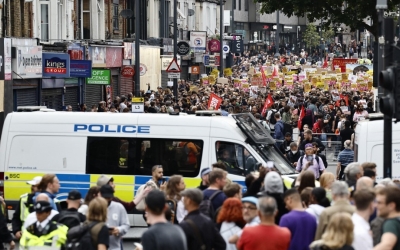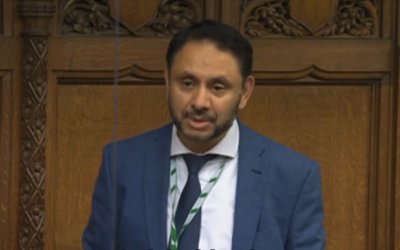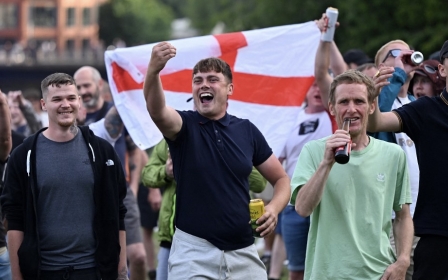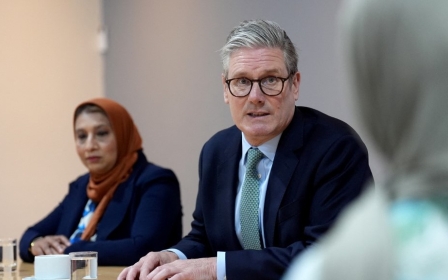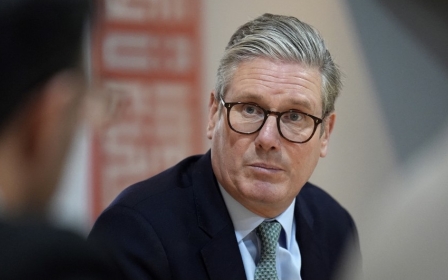Far-right riots: British Muslims say there has been no public reckoning
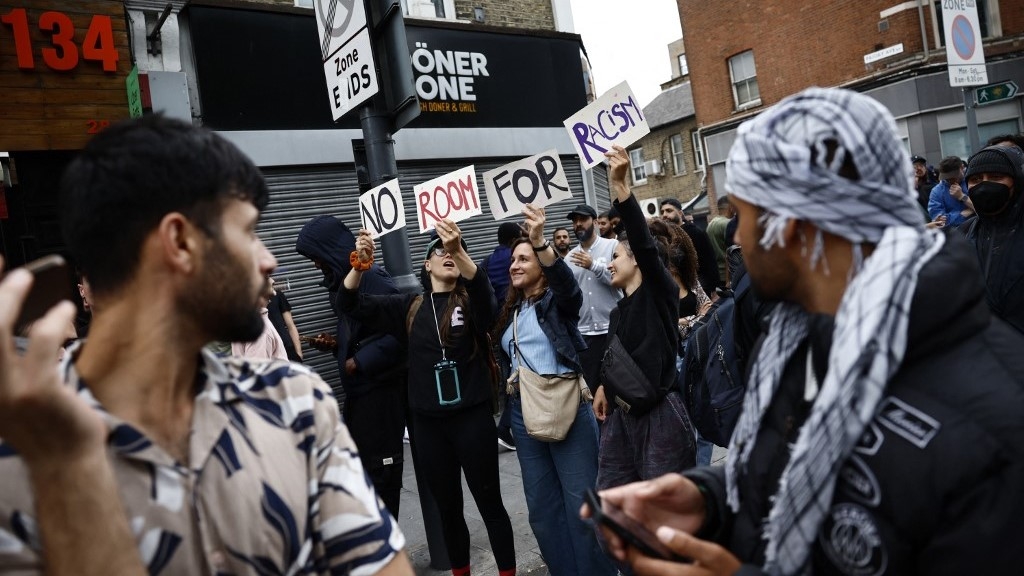
Has Britain seriously reckoned with the recent far-right riots that swept the country? Many Muslims feel it hasn't.
Violent disorder raged in cities and towns across Britain for over a week in late July and early August. The riots were triggered by online misinformation following a stabbing attack that killed three young children in the northern English town of Southport on 29 July.
False claims spread rapidly online that the attacker was a Muslim and illegal immigrant.
What followed was a spate of racist and Islamophobic mob attacks. Mosques were targeted and so were hotels housing asylum seekers. Members of ethnic minorities were violently assaulted. Immigrant businesses in some areas boarded themselves up as the government pledged extra security for mosques.
Then came the crackdown. Recent weeks have seen more than a thousand people arrested. Over half have been charged and hundreds prosecuted for taking part in the rioting, including Muslims who retaliated against far-right attacks.
New MEE newsletter: Jerusalem Dispatch
Sign up to get the latest insights and analysis on Israel-Palestine, alongside Turkey Unpacked and other MEE newsletters
Now calm has taken hold. There are no more violent disturbances in sight. But many feel it’s an uneasy calm - and that the deeper issues behind the rioting have remained unchallenged.
Lila Tamea, 26, lives in Liverpool and is doing a PhD on the subject of Islamophobia in education. She attends the local Sheikh Abdullah Quilliam Mosque - named after the famous British Muslim Abdullah Quilliam.
When the riots kicked off, Tamea headed to the mosque to join its congregation and members of the local community - including supportive non-Muslims - in a gathering outside the mosque.
Their goal that evening wasn’t just to protect the mosque against a predicted far-right riot - it was to engage with people.
And so the demonstrators arrived at the mosque to protest, only to be served food by the Muslims outside it.
“We ended up speaking and engaging with some of them,” Tamea told Middle East Eye.
Were any of the discussions fruitful? “I’m not sure I’d say they were fruitful but they were certainly interesting,” she said.
What a lovely end to the night. @adamkelwick and I managed to get to the other side and speak to some of the protestors.
— Lila (@LilaTamea) August 2, 2024
They were peaceful on the whole with only one hostile encounter, when the police came in and advised us to go back.
The only way forward is dialogue. pic.twitter.com/X1TSP8quYm
Tamea quickly realised that not all those there had the same views or motivations.
“You had a mix of people rioting - you had the far-right fash [fascists], then you had people in the middle who had concerns about Islam and immigration, and then you had the teenagers roaming around shouting things like ‘F the immigrants’.”
This led her to believe that the roots of the disorder run deep and cannot be easily fixed by punitive policing.
It’s not the guys who were robbing bath bombs from Lush that we’re scared of, it’s the ones attacking us
- Lilah Tameah, student
Tamea told MEE she feels much less safe since the riots. “We’re thinking things are all OK now and back to normal because the harsh sentencing has deterred people. But are people being deterred, or are they being silenced and not able to express their views, meaning when they do it’ll be very violent and spontaneous?”
She believes the government has done too little to tackle the deeper causes of the riots.
“It’s not the guys who were robbing bath bombs from Lush that we’re scared of, it’s the ones attacking us and having dangerous views about Muslims and Islam. Nothing’s being done to tackle it. There’s been little to acknowledge the feeling of a lack of safety.”
Tamea said she thinks “more funding into community projects to encourage cohesion” would be the right government response moving forward, not new policing powers. “We need more facilitation of conversations.”
‘Not enough’ engagement with Muslims
Abdi Ahmed, a 21-year-old student studying politics, also lives in Liverpool. He said he felt vulnerable as a Muslim during the riots - but that community leaders and mosques played a “crucial role in bringing people together”.
He was less complimentary about the government’s response, describing it as “inadequate”.
“There hasn’t been enough direct engagement with Muslim communities, and efforts to combat Islamophobia feel surface-level.
“I would like to see more concrete actions, such as better protection for mosques, stronger legislation against hate crimes and more inclusive dialogue that includes Muslim voices in policy-making.”
Polling has shown that three-quarters of Muslims are now worried for their safety, compared with only 16 percent before the riots.
And nearly one in five Muslims say they have personally faced hostility since the Southport stabbings.
Hamda Mohamed, 25, lives in Birmingham. She feels everything changed in the last month.
“Life after the riots is strange,” she told MEE, “having to be wary yet continue living as if the country didn't just try to burn itself down.”
During the riots, Mohamed said, it was frightening “having to double guess my choices of whether to leave the house or stay at home. Seeing friends share self-defence classes and encouraging one another about what to do if they are ever caught up in those situations was unnerving.
“It's not a new experience feeling unsafe in the country I call home as a visible Muslim woman, yet it's the first time I've had to look twice at people to determine what their intentions were.”
But not everything was bad. Seeing non-Muslims coming out and standing in solidarity with Muslims against the far right “has made me feel calmer and appreciate the kind souls who also call this stretch of land home”, Mohamed said.
“But I may always have this worry of how long this calm will last until we see communities on all sides forgotten by the government boil over once more.”
Only a ‘bandage’
Like Lila Tamea in Liverpool, Mohamed is notably empathetic towards some of the rioters and sees their actions as the result of a series of complex factors.
“Without tackling the root cause of the Islamophobic riots caused by decades of anti-Muslim rhetoric by mainstream media and elected officials, the measures the government has taken in the wake of the riots serve only to act as a bandage to the issues,” she said.
“We have a crumbling NHS, stagnant wages, and years of austerity that cannot be fixed overnight. As a nation, we shouldn't be pointing fingers at one another or using migrants as scapegoats for failings of elected officials.”
In an interview with MEE, Scottish MP and former First Minister Humza Yousaf commented on the recent far right riots in the UK, the response of Keir Starmer’s government, and the role some politicians and public figures, such as Nigel Farage and Elon Musk, played in fueling the… pic.twitter.com/x9PabgNobl
— Middle East Eye (@MiddleEastEye) August 14, 2024
Many have questioned the government’s characterisation of the riots.
During the rioting, Prime Minister Keir Starmer did not specifically call the disorder Islamophobic or racist, referring to it as “far-right thuggery”.
Since then the Royal United Services Institute (Rusi), Britain’s leading defence and security think tank, has said Britain treats far-right attacks less seriously than "Islamist" violence - warning of “troubling double standards”.
Rusi argued that the the prime minister’s rhetoric “downplays the organised networked, and ideological components of the riots”.
Speaking to MEE last week, Shockat Adam, the recently elected independent MP for Leicester South, described the riots as “the manifestation of decades-long rhetoric, political irresponsibility, media irresponsibility, legislative inefficiencies”.
Adam pointed to former Conservative prime minister Boris Johnson comparing Muslim women wearing face veils to letterboxes and bank robbers in 2018. He also highlighted former Conservative home secretary Suella Braverman in February claiming that Islamists control Britain.
“There were no repercussions. Nobody’s held accountable. It is irresponsible rhetoric of this nature that leads to the riots that we saw.”
John Holmwood, an emeritus professor of sociology, told MEE that while the conditions for the riots were created on the previous government’s watch, Labour nonetheless bears “some responsibility”.
This is because Labour has failed to challenge damaging and false narratives about British Muslims, he said.
“In opposition, Labour didn’t challenge narratives about immigration and that some Muslim communities live separate lives outside mainstream British values. The party acted in the last election as if voters in ‘red-wall’ seats shared these views.”
Holmwood said this weakness on Labour’s part has continued since the riots. “Even now, they have failed to call out Islamophobia or indicate a commitment to Muslims in Britain as fellow citizens with an equal right to participate in public life.”
It was over a week after the riots began, on Thursday 8 August, that Starmer first visited a mosque.
And the next day, MEE revealed that the government had been ignoring communications from the country’s largest body representing British Muslims, the Muslim Council of Britain (MCB), throughout the riots.
An MCB spokesperson told MEE on Tuesday that the government’s “firm response, including swift sentencing and a zero-tolerance approach, has been commendable. Initiatives such as the Protective Security for Mosques Scheme and increased security at mosques have been widely welcomed.”
However, the MCB urged the government to adopt the definition of Islamophobia proposed years ago by the All-Party Parliamentary Group on British Muslims.
“A dedicated task force is essential to combat Islamophobia and ensure meaningful action.
“Rebuilding trust with Muslim communities is essential and can only be achieved through sustained, genuine dialogue and concrete actions that address their concerns and fears.”
MP Shockat Adam believes the government should take Islamophobia seriously by creating a role designed to tackle it akin to the independent adviser on antisemitism. “The Muslim community are not asking for favours, they’re just asking for parity.”
He worries that riots could recur if the government fails to change course.
“If we do not get a handle on this, there’s going to be more coming.”
Middle East Eye delivers independent and unrivalled coverage and analysis of the Middle East, North Africa and beyond. To learn more about republishing this content and the associated fees, please fill out this form. More about MEE can be found here.


